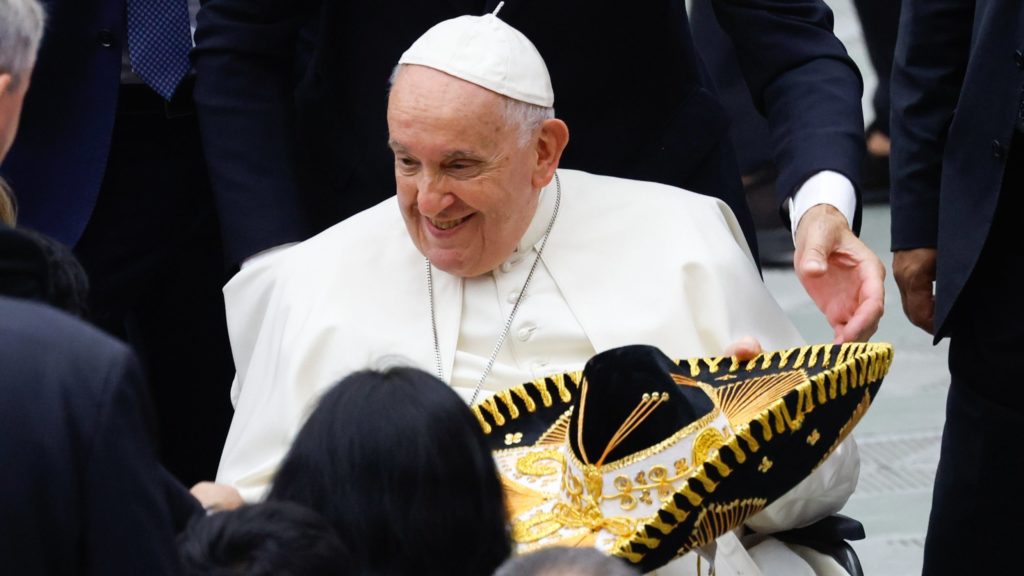Our Lady of Guadalupe and other recognized Marian apparitions show clearly how evangelization does not require complicated plans and elaborate theological explanations but sharing the faith in "a language suitable for all, a language that is comprehensible, like that of Jesus," Pope Francis said.
At Guadalupe, in fact, "Our Lady proclaims God in the most suitable language -- the mother tongue" of St. Juan Diego and the Indigenous people of Mexico, the pope said Aug. 23 at his weekly general audience.
Speaking to several thousand people gathered in the air-conditioned Vatican audience hall as temperatures rose outside, the pope returned to his series of audience talks about "apostolic zeal" and "passion for evangelization."
In each talk in the series, the pope has highlighted a "witness" or witnesses that demonstrate important aspects of sharing the Gospel with others. His focus Aug. 23 was on "inculturation," and the "witnesses" he chose were St. Juan Diego and Our Lady of Guadalupe, who appeared to the Indigenous saint in 1531.
Christianity already was being preached in the Americas, the pope said, "but unfortunately it had also been accompanied by worldly interests. Instead of the path of inculturation, too often, the hasty approach of transplanting and imposing preconstituted models -- European, for example -- had been taken, lacking respect for the Indigenous peoples."
Mary, though, appearing to Juan Diego, comes "dressed in the clothing of the native peoples, she speaks their language, she welcomes and loves the local culture," the pope said. "Mary is mother, and under her mantle every child finds a place. In Mary, God became flesh, and through Mary, he continues to incarnate himself in the lives of peoples."
Hearing the Gospel in one's "mother tongue" is effective, the pope said. "Mary speaks to us, too, in our mother tongue, that which we understand well."
The pope used the audience as an opportunity to thank "the many mothers and grandmothers who pass the faith on to their children and grandchildren," and he asked the people in the audience hall to give a round of applause to mothers and grandmothers.
"As Mary shows, the Gospel is communicated in simplicity," the pope said. "Our Lady always chooses those who are simple," whether appearing to St. Juan Diego on Tepeyac Hill in Mexico or to St. Bernadette Soubirous at Lourdes, France, or the three shepherd children in Fátima, Portugal.
All three apparitions also show that having zeal and passion for sharing the Gospel does not mean everything will go off without a hitch, the pope said. Our Lady of Guadalupe sent Juan Diego to the local bishop to ask him to build a church on Tepeyac Hill. The bishop dismissed him twice.
"Despite zeal, the unexpected arrives, sometimes from the church itself," the pope said.
"Don't forget this; it's very important: To proclaim the Gospel, it is not enough to witness to the good, but it is necessary to be able to endure evil," the pope said. "Even today, in so many places, inculturating the Gospel and evangelizing cultures requires perseverance and patience, it requires not fearing conflict, not losing heart."
Pope Francis told the crowd he was thinking particularly of a specific country, which he did not name, "where Christians are persecuted because they are Christians and cannot practice their religion well and in peace."
But Mary encourages and reassures Juan Diego, telling him, "Am I not here, I who am your mother?"
"This is beautiful," the pope said. "So many times, when we are in desolation, in sadness, in difficulty, she also says it to us, to our hearts: 'Am I not here, I who am your mother?'"
After Our Lady of Guadalupe gave Juan Diego a sign -- her image on his cloak -- and the bishop approved the building of a church, the pope said, he dedicated his life to welcoming pilgrims and evangelizing them.
Today at the Mexican shrine and at Marian shrines around the world, people continue to be evangelized in a "simple and genuine" way, the pope said. "We need to go to these oases of consolation and mercy, where faith is expressed in our mother tongue, where we lay down the labors of life in Our Lady's arms and return to life with peace in our hearts."

